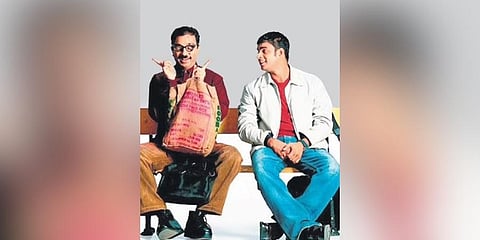

Anbe Sivam (2003)
Watching Anbe Sivam in the theatre was a beautiful experience. Its politics felt different when I watched it back then and it is still relevant. The film follows the journey of two characters, played by Kamal Haasan and R Madhavan, who share left and right-wing ideologies, respectively. By journey, the film not just talks about characters travelling from one place to another, but also shifts in mentality from one phase to the other. The characters feel real and are neatly fleshed out; their characteristics are exhibited throughout the film in multiple ways. Of course, there are numerous layers and themes in the film—like atheism and communism—but it propagates the message that there is God in every human. This, I believe, instills a lot of hope.
12 Angry Men (1957)
12 Angry Men is a path breaking film on many fronts. Like Anbe Sivam, this is also a film that talks about humanity. The film, set entirely in a closed room, has 12 characters hailing from different social strata, and they become our guide to the whole American society. Perception is its core theme and it is about a crime which we never get to see. Instead, the film compels us to imagine the crime and many other incidents, just like the characters. By restraining us from witnessing the crime, the film makes its point that we see and process everything through our personal life experiences.
Old Boy (2003)
Park Chan-wook is my manasika guru. When I started watching his filmography, my friends would wonder why I was watching such ultra-violent films. I always felt his violence was quite artistic. His films also define revenge beautifully. In Old Boy, the protagonist is kidnapped by an unidentified person and held in isolation for 15 years, without giving a single answer. We might feel that this period of isolation and misery is a way for the unidentified man to seek revenge, but no, he begins to plot the actual revenge by setting the protagonist free. Revenge is not just physically hurting the perpetrator, but making them through the pain of the victim. This is the angle I aimed for in my first film, Puriyatha Puthir.
Troy (2004)
Troy is the only film on this list that I had the chance to watch on the big screen. The film is grand, but it is also quite emotional. This is a war epic but the two main characters in it, Achilles and Hector, are not directly connected to the war. They are forced into it by circumstances. And Hector, in fact, tells his brother Paris that there is nothing poetic about war. The film is a tragedy and it leaves you confused about the side you are supposed to pick. Even though it’s a grand war drama, it also speaks about the tragedies and the terrible side of war.
Rabbit-proof Fence (2002)
As a child, I once attended Veerapandi thiruvizha with my mother and got lost in the crowd. Although it was only for five minutes, I was scared for my life and started crying, wondering if I would ever be able to reunite with my mother. Rabbit-proof Fence fills you with a similar anxiety. I discovered this on DVD and was immediately sucked into its world within minutes. The film, based on a true story, follows the lives of three girls hailing from the Aboriginal tribe who are snatched away from their families by the government in a scheme to wipe out their race, and their efforts to return home. Even recalling the film and some scenes still gives me goosebumps. It is an extraordinary movie.
RANJIT JEYAKODI
A biweekly column exploring the films that inspired, influenced and shaped the cinematic sensibilities of contemporary filmmakers